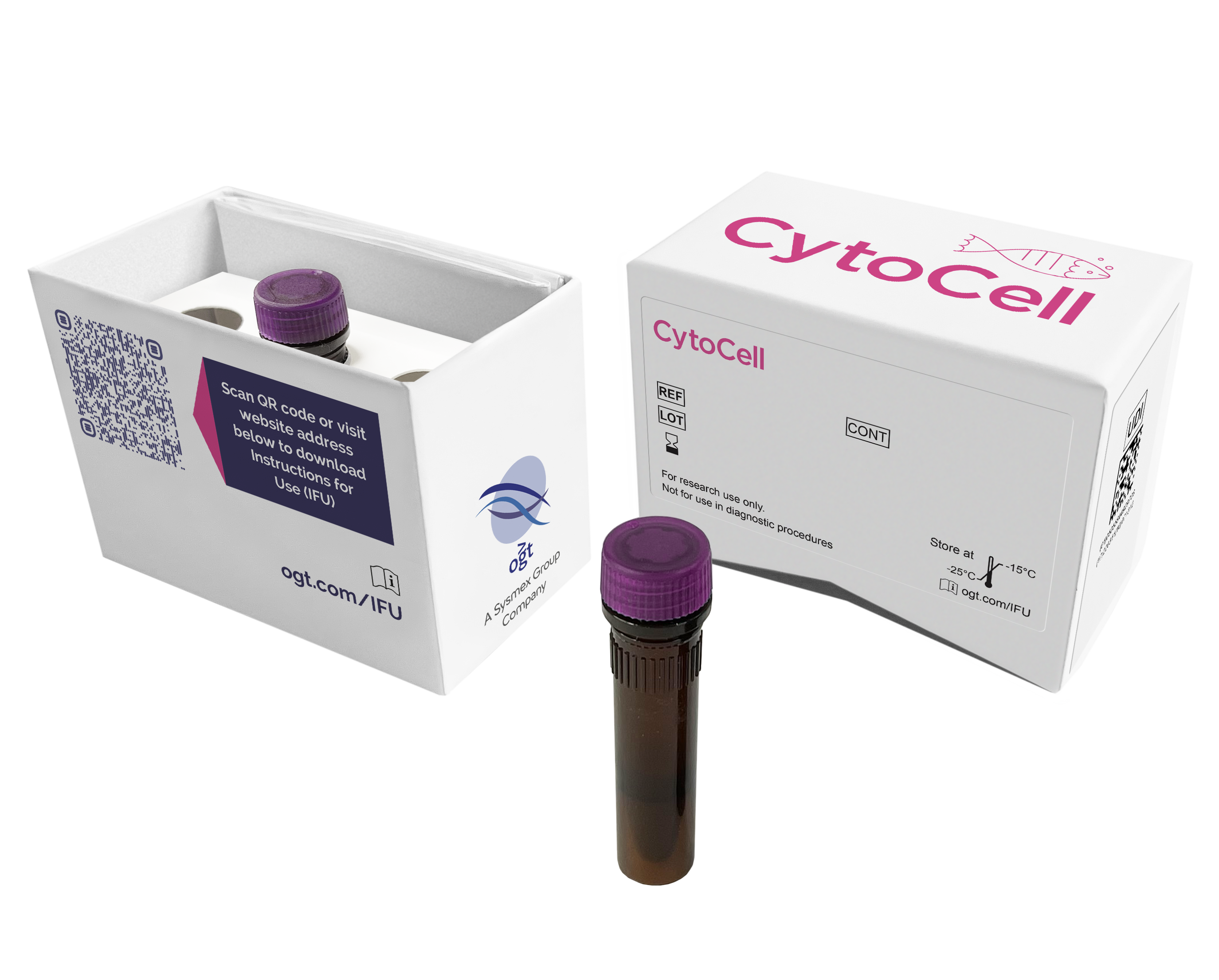
The green probe mix contains a 124kb probe and a 416kb probe that spans the ITM2B, RB1 and RCBTB2 genes. The orange probe mix covers a region on 21q22.1 from the DYRK1A gene to the DSCR8 gene.
Down Syndrome (DS) is an autosomal trisomy that is caused by the presence of a third (partial or total) copy of chromosome 21 and is characterised by variable intellectual disability, muscular hypotonia, and joint laxity, often associated with a characteristic facial dysmorphism and various anomalies such as cardiac, gastrointestinal, neurosensorial or endocrine defects1,2. DS is one of the leading causes of intellectual disability worldwide and these patients also face various health issues including learning and memory, congenital heart diseases (CHD), Alzheimer’s diseases (AD), leukaemia, cancers and Hirschsprung disease (HD)1. DS has high genetic complexity and phenotype variability1. At 16 weeks gestation of pregnancy, the incidences of DS pregnancies are 1 in 1050 for mothers aged 20 years, 1 in 620 for mothers aged 30 years and 1 in 70 for mothers aged 40 years3.
Patau Syndrome (PS) is a chromosomal anomaly caused by the presence of an extra chromosome 13 and is characterised by brain malformations (holoprosencephaly), facial dysmorphism, ocular anomalies, postaxial polydactyly, visceral malformations (cardiopathy) and severe psychomotor retardation2. PS is associated with phenotypic holoprosencephaly and midline fusion abnormalities due to defective fusion of the prechordal mesoderm in the embryonic stage4. At 16 weeks gestation of pregnancy, the incidence of PS pregnancies are 1 in 11 000 for mothers aged 20 years, 1 in 6500 for mothers aged 30 years and 1 in 700 for mothers aged 40 years3.
The CytoCell® Prenatal 13 and 21 Enumeration Probe Kit is a qualitative, non-automated, fluorescence in situ hybridisation (FISH) test used to detect the chromosome 13q14.2 region and the chromosome 21q22.1 region in Carnoy’s solution (3:1 methanol/acetic acid) fixed cells derived from amniotic fluid samples, in enumerating chromosomes 13 and 21 in high-risk pregnancies where Down or Patau syndrome are suspected.
This device is designed as an adjunct to other clinical and laboratory tests in recognised diagnostic and clinical care pathways, such as ultrasound screening and biochemical testing, where knowledge of the copy number status of the chromosome 13q14.2 region and the chromosome 21q22.1 region would be important for patient management.
This device is designed to detect chromosomal material which includes the chromosome 13q14.2 and chromosome 21q22.1 regions covered by the green and orange clones in this probe set respectively. Genomic gains or losses outside these regions, or partial losses or gains of these regions may not be detected with this device.
This device is not intended for: use as a stand-alone diagnostic, use as a companion diagnostic, population-based screening, near-patient testing, or self-testing, and has not been validated for sample types, disease types, or purposes outside of those stated in the intended purpose.
This device is intended as an adjunct to other diagnostic laboratory tests and therapeutic action should not be initiated on the basis of the FISH result alone.
Reporting and interpretation of FISH results should be performed by suitably qualified staff, consistent with professional standards of practice, and should take into consideration other relevant test results, clinical and diagnostic information.
This device is intended for laboratory professional use only.
Failure to adhere to the protocol may affect the performance and lead to false positive/negative results.
Find certificate of analysis documentation for our CytoCell FISH probes
Our lab has been using a wide range of CytoCell FISH probes for a number of years, and have been increasing this range all the time. The probes have clear bright signals and show good reproducibility. CytoCell provides fast delivery of catalogue probes, and are very responsive when we have any queries or problems with their products.

Bridget Manasse
Addenbrookes Hospital, Cambridge University Hosiptals NHS Foundation Trust, UK
In our hands, CytoCell FISH probes have proven to be of the highest quality with bright, easy to interpret signals, thus providing confidence in our results. OGT's customer support is outstanding, as their staff are extremely knowledgeable and truly care about their customers and their customers’ needs.

Jennie Thurston
Director of Cytogenetics, Carolinas Pathology Group, USA
I first came across CytoCell FISH probes in a previous lab I worked in and I was struck by the quality of the products. Since this time, I have been recommending and introducing CytoCell probes across all application areas — now they are the primary FISH probes used in our lab. They have an excellent range of products and their ready-to-use reagent format saves considerable time.

Elizabeth Benner
Medical Technologist, University of Arizona Health Network, USA
We have been working with CytoCell fish probes for two decades because of their excellent clarity and intensity regardless of the size of the probe. It is so clear and simple to detect.
Dr. Marina Djurisic
Head of Laboratory of Medical Genetics, Mother and Child Health Care Institute of Serbia “Dr Vukan Cupic”, Serbia
The quality and consistency of CytoCell’s probes means I can trust the results, and my clients get their results in a timely manner.

Dr. Theresa C. Brown
Director, Cytogenetics Laboratory, Hayward Genetics Center, Tulane University School of Medicine, USA
It was very important for us to have more consistent results with our probes — easy-to-read bright signals and a range of vial sizes, which is much more cost-effective.

Janet Cowan, PhD
Director of the Cytogenetics Laboratory, Tufts Medical Center, USA
Not only do CytoCell offer an extensive range of high-quality FISH probes, the customer support is also excellent — providing fast access to all the probes I need. The probes are highly consistent with bright signals allowing easy scoring of results.
Dr. Eric Crawford
Senior Director, Genetics Associates Inc., USA
The quality and reproducibility of results using the CytoCell kit has been vital in accurately detecting co-deletions in our glioma investigations. We now have a cost-effective test that we can rely on that is also easy to use and interpret. We've been consistently impressed with this kit - not to mention the support offered by OGT's customer service, and have completely transitioned over to CytoCell probes.
Gavin Cuthbert, FRCPath
Head of Cancer Cytogenetics, Northern Genetics Servce, Newcastle, UK